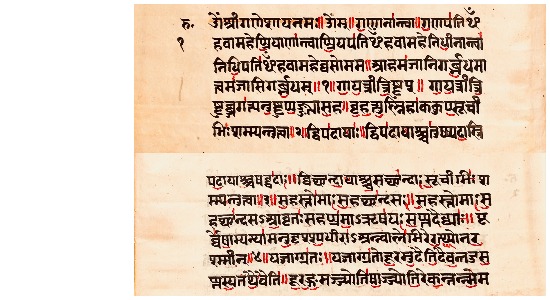Here are a collection of Sanskrit quotes, thoughts, and Shlokas that are pure gems of wisdom. All of us know, that Sanskrit is considered to be the mother of all languages, the oldest language known to the world. Sanskrit as a language has its origins dating back to 1700-1200 BCE when Vedic Sanskrit is believed to have originated. Sanskrit is the language of the Vedas, Upanishads and other ancient Hindu scriptures and epics.
Around 1000 BCE, Sanskrit slowly transitioned from being a primary language of communication to a language of learning and religion. Sanskrit is, without doubt, the key to a vast and unlimited treasure of wisdom that comes alive in various Sanskrit quotes, thoughts, and shlokas.
Table of Contents
Inspiring Sanskrit Quotes For All Occasions

Sanskrit is known for its symmetrical perfection. Around the year 500 BCE, the great Sanskrit grammarian Panini standardized Vedic Sanskrit and gave birth to what is termed as Classical Sanskrit. Here we take a look at some of the most inspiring Sanskrit quotes drawn from the Vedas, Upanishads, and the Bhagavad Gita.
Enlightening Sanskrit Quotes – The Mahavakyas

It is appropriate that we start with the Mahavakyas from the Upanishads which are shining pearls of wisdom. They are the epitome of brevity but carry the entire meaning of life and the cosmos within a few words. The Mahavakyas literally mean, “great sayings”, and they encapsulate within them the philosophy of Vedanta.
-
प्रज्ञानम् ब्रह्म
Prajñānam Brahma – It means, ” Knowledge is Brahma.” This Mahavakya is from the Aitareya Upanishad.
-
अयम् आत्मा ब्रह्म
Ayam Ātmā Brahma – It means, “This Self(Atman) is Brahma.” This Mahavakya is from the Mandukya Upanishad.
-
तत् त्वम् असि
Tat Tvam Asi – It means, That Thou Art.”This Mahavakya is from the Chandogya Upanishad.
-
अहम् ब्रह्मास्मि
Aham Brahmāsmi – It means, “I am Brahma.” This Mahavakya is from the Brihadaranyaka Upanishad.
Sanskrit Quotes From The Bhagavad Gita

The Bhagavad Gita is a font of knowledge. The wisdom of the Gita is relevant even today and its 700 Shlokas embody the meaning of life and death and form the essence of Hindu philosophy.
कर्मण्येवाधिकारस्ते मा फलेषु कदाचन |मा कर्मफलहेतुर्भूर्मा ते सङ्गोऽस्त्वकर्मणि ||
karmaṇy-evādhikāras te mā phaleṣhu kadāchana
mā karma-phala-hetur bhūr mā te saṅgo ’stvakarmaṇi
The meaning of this Shloka in English is that “One has a right only over the duties or work and not its fruits or results, one should not be attached to inaction either, not consider oneself as the one causing the results of the actions.
नैनं छिन्दन्ति शस्त्राणि नैनं दहति पावकः।न चैनं क्लेदयन्त्यापो न शोषयति मारुतः॥
nainaṁ chindanti śastrāṇi
nainaṁ dahati pāvakaḥ
na cainaṁ kledayanty āpo
na śoṣayati mārutaḥ
The meaning of this Shloka from the Bhagavad Gita is, “the soul can never be cut by any weapon, nor burned by fire, nor moistened by water or withered by the wind.”
यदा यदा हि धर्मस्य ग्लानिर्भवति भारत।
अभ्युत्थानमधर्मस्य तदात्मानं सृजाम्यहम् ॥परित्राणाय साधूनां विनाशाय च दुष्कृताम् ।
धर्मसंस्थापनार्थाय सम्भवामि युगे युगे ॥
Yada yada hi dharmasya glanirbhavati bharata
Abhythanamadharmasya tadatmanam srijamyaham
Paritranaya sadhunang vinashay cha dushkritam
Dharmasangsthapanarthay sambhabami yuge yuge
This is a famous Shloka from the Bhagavad Gita. Here is the meaning of this Shloka in English.
Whenever there is decay of righteousness, O Bharata,
And there is exaltation of unrighteousness, then I Myself come forth ;
For the protection of the good, for the destruction of evil-doers,
For the sake of firmly establishing righteousness, I am born from age to age.
पत्रं पुष्पं फलं तोयं यो मे भक्त्या प्रयच्छति।तदहं भक्त्युपहृतमश्नामि प्रयतात्मनः।
patraṁ puṣpaṁ phalaṁ toyaṁ
yo me bhaktyā prayacchati
tad ahaṁ bhakty-upahṛtam
aśnāmi prayatātmanaḥ
Here is the meaning of the Shloka in English. Lord Krishna says, “If one offers Me with love and devotion a leaf, a flower, fruit, or water, I will accept it.”
उद्धरेदात्मनात्मानं नात्मानमवसादयेत् |
आत्मैव ह्यात्मनो बन्धुरात्मैव रिपुरात्मन: ||
uddharedaatmanaatmaanam naatmaanamavasaadayeth
aatmaiva hyaatmano bandhuraatmaiva ripuraatmanah
The meaning of this Shloka is: Let a man raise himself by his own efforts. Let him not degrade himself.
Because a person’s best friend or his worst enemy is none other than his own self.
Some More Sanskrit Quotes From The Upanishads

Here are some more famous Sanskrit Quotes from various Upanishads.
सत्यमेव जयते नानृतं सत्येन पन्था विततो देवयानः ।
येनाक्रमन्त्यृषयो ह्याप्तकामा यत्र तत् सत्यस्य परमं निधानम् ॥
satyameva jayate nānṛtaṃ
satyena panthā vitato devayānaḥ
yenākramantyṛṣayo hyāptakāmā
yatra tat satyasya paramaṃ nidhānam
This is a famous Sanskrit Shloka from the Mundaka Upanishad. The first two words of this Shloka can be found in India’s national emblem, where the phrase, “सत्यमेव जयते”, appears.
The meaning of this Sanskrit Shloka in English is as under:
“Truth alone triumphs; not falsehood.
Through truth, the divine path is spread out
by which the sages whose desires have been completely fulfilled,
reach to where is that supreme treasure of Truth.”
मातृ देवो भव।
पितृ देवो भव।
आचार्य देवो भव।
अतिथि देवो भव॥
Maathru Devo Bhava, Pithru Devo Bhava, Aacharya Devo Bhava, Athithi Devo Bhava.
This is a Shloka from the Taittiriya Upanishad. The Shloka means, “honour your mother as God, honour your father as God, honour your teacher or Guru as God, and honour your guest as God.”
ॐ असतो मा सद्गमय ।
तमसो मा ज्योतिर्गमय ।
मृत्योर्मा अमृतं गमय ।
ॐ शान्तिः शान्तिः शान्तिः ॥
asato mā sadgamaya
tamasomā jyotir gamaya
mrityormāamritam gamaya
Oṁ śhānti śhānti śhāntiḥ
This shloka is from the Brihadaranyaka Upanishad. It means, “Lead me from the unreal to the real, lead me from darkness to light, lead me from death to immortality.”
धर्मं चर। धर्मान्न प्रमदितव्यम्।
dharmaṃ cara। dharmānna pramaditavyam।
This Sanskrit quote or shloka is from the Taittiriya Upanishad. The meaning of this Shloka is, “Practice righteousness (Dharma). Do not swerve from righteousness (Dharma).”
विद्यां चाविद्यां च यस्तद्वेदोभ्य सह ।
अविद्यया मृत्युं तीर्त्वाऽमृतमश्नुते ॥
vidyāṃ cāvidyāṃ ca yastadvedobhya saha ।
avidyayā mṛtyuṃ tīrtvā’mṛtamaśnute ॥
This is a Shloka from the Isa Upanishad. It means, “One who knows both, the material science as well as the spiritual science, transgresses fear of death by the former, i.e. by proper bodily and mental efforts, and attains salvation by the latter, i.e. by the purity of mind and soul.”
These are some beautiful Sanskrit quotes from the ancient scriptures of India. Sanskrit as a language needs to get its due. It is an important part of the rich, intangible heritage of India. It is heartening to note that in an effort to promote awareness of Sanskrit, World Sanskrit Day or Vishva-samskrita-dinam ( विश्वसंस्कृतदिनम्), is celebrated on Shravan Purnima day, the Full Moon Day of the Shraavana month according to the Hindu Calendar. In the year 2021, August 22, 2021, is being celebrated as World Sanskrit Day.
We hope you like our collection of some of the most precious Sanskrit quotes drawn from the ancient scriptures of India. Do let us know your thoughts through our comments section.
Thanks for visiting our site nirvandiaries.com and taking the time to read this post.
If you wish to collaborate or work with us then reach us at [email protected]
We’d love if you’d comment by sharing your thoughts on this post and share this post on social media and with your friends.
Follow our journey on our social media channels:
Facebook Twitter Instagram Pinterest









Kindly help me to know that Shloka “Bagarthabi sampriktou—–” for my own research,. Get me the origin of the shloka and its transliteration and translation as well
Thank you for your interest and query, please find the answers that you were looking for and hope it helps.
This shloka is the opening of Kalidasa’s Raghuvamsam, which is an epic of 1,564 shlokas or stanzas.This shloka is addressed to the deities Shiva and Parvati, asking for their blessings as Kalidasa begins the writing of the epic Raghuvamsa, which is about the ancestors of Shri Ram, the Raghu dynasty.
वागर्थाविव सम्प्रुक्तौ वागर्थप्रतिपत्तये
जगतः पितरौ वन्दे पार्वतीपरमेश्वरौ |
Vagarthaviva sampriktau vagarthah pratipattaye | Jagatah pitarau vande parvathiparameshwarau || – Raghuvamsha 1.1
Literal Meaning as under:
I pray parents of the world, Lord Shiva and Mother Parvathi, who are inseparable as speech and its meaning to gain knowledge of speech and its meaning.